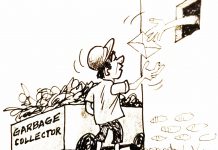
While the nation totters at this very moment at the edge of despair—job scarcity, spiraling prices, crumbling quality of education, territorial losses at the West Philippine Sea, etcetera—our leaders go about strutting around like actors rehearsing for the next political drama. Politicking over problem-solving; egos over empathy; electioneering over everything else: it just reeks of hypocrisy!
The public has seen through this circus, but the clowns in office think their tricks still work. They should be facing food shortages or the alarming decline in literacy rates, but no; this bunch of clowns is preoccupied with making alliances that feel like episodes from a badly scripted teleserye. I scroll through my newsfeed and see them accusing each other, filing lawsuits against rivals, or organizing lavish dinners to solidify alliances, while farmers are begging for fair crop prices. It’s like watching firefighters arguing over the color of their trucks while the neighborhood burns.
Take the classic example here in Samar: roads that feel like obstacle courses, barangay clinics without even basic medicine, classrooms bursting at the seams. But in Manila, it’s the “honorables” preening for the camera, sharpening their tongues rather than their development plans. They can visit the interiors of the island and see firsthand how despair shades the peasants’ days, but that probably would just spoil the fresh polishing of their images for the next media appearance.
The sheer audacity of it all makes me wonder: Do they even remember who they’re supposed to serve? They will call for unity in grand speeches, complete with dramatic pauses, but behind closed doors, it’s a free-for-all for power. Their platforms become promises, their promises become dust, and their dust is swept under the rug for the next election cycle. If leadership were a game, it would be a demented version of musical chairs, where no one cares if the public is left standing.
What’s worse is how normalized this all feels now. Corruption scandals? Just another Tuesday. Partisan bickering? Background noise. The average Juan has grown so accustomed to the dysfunction that many no longer bother to protest. We’re too busy surviving—budgeting an ever-dwindling income, navigating floods without proper drainage systems, and sending our children to schools where the desks outnumber the textbooks. Their politicking feels like an insult to our quiet resilience.
But let us not romanticize this resilience. I am so tired of hearing, “Filipinos are strong,” as if the government’s inaction is justified. We are strong, yes; we would rather not be forced to be that strong. Our leaders’ wrong priorities in chasing headlines rather than solutions have turned strength into a survival skill rather than a choice. It’s not resilience; it’s resignation—a fact that isn’t something to celebrate.
If our leaders had any ounce of sincerity left, they would spend more time solving actual problems rather than attacking each other. Why not launch a real campaign against hunger instead of smear campaigns? Instead of hosting dinners for alliances, how about hosting dialogues with citizens? We don’t need theatrics but actions that translate to full plates, safer streets, and better futures.
I don’t have all the answers, but one thing’s for sure: it starts with listening. Not the kind of listening that happens at photo ops or public forums, but the kind that leads to action. They might just find out how badly they’re failing us if they tuned out their voices for once and tuned in to ours. It’s up to us in the meantime to keep reminding them—loud and relentless—that we deserve better than this charade.



